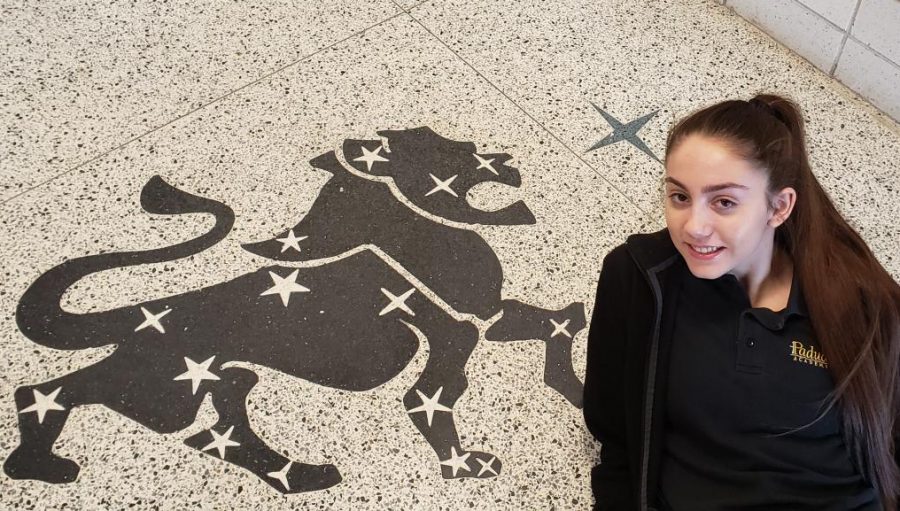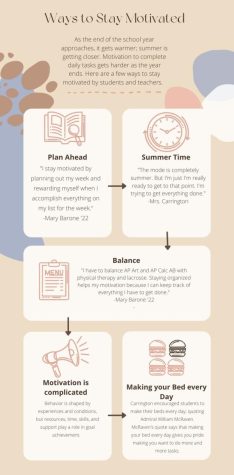Jess Molen: Avid Astrologer
Jess Molen poses in front of a zodiac symbol, a crucial aspect of astrology.
Astrology is the study of how celestial bodies affect humans and the natural world, and it has been met with much criticism from scientists over the years. However, junior and astrology aficionado Jess Molen thinks differently. She has a great interest in the subject, keeping in mind the difference between “pop astrology” and the branch that she trusts and studies.
“The popular definition of astrology is different than what the actual… thing is,” Molen said. “It’s more of… looking at how the planets and different celestial beings determine or influence day-to-day life.”
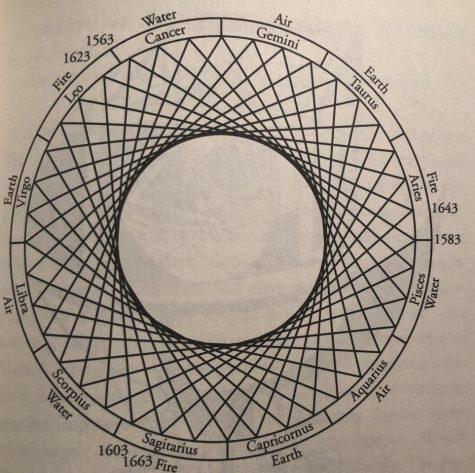
This chart classifies the 12 zodiac signs and their elements.
According to Molen, there are multiple different branches and components of astrology. They all aim to show the stars and planets’ influence on our lives through a variety of methods.
“There’s horoscopes, there’s chart readings, there’s, like, tarot card readings,” she said. “Those all together make up the big branch of astrology.”
Molen usually tries to compare her findings to her own personality when looking deeper into astrological research.
“I just find it very interesting because… sometimes you can see a connection and you can see similarities or differences,” she said. “I think it’s something that’s really fun to, like, study and look into.”
Molen began to dive further into astrology due to a new-found passion for studying birth charts, which show what the sky looked like at the time of a person’s birth.
“I’d always read, like, the horoscopes in the paper… and online, but I started getting into it when I saw something online about your birth charts,” she said.
Molen does not take the readings she finds as the complete truth, but instead uses them as suggestions about how to improve herself.
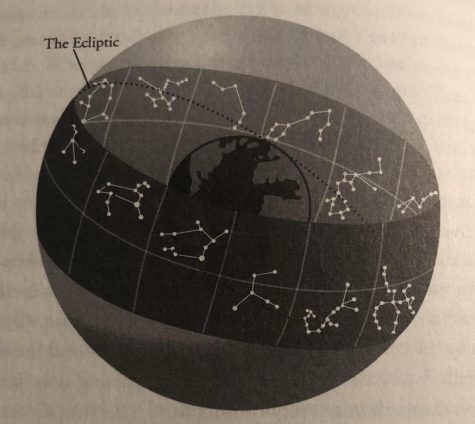
This model depicts the locations of the zodiac constellations.
“I don’t think it’s something that I use to make my decisions,” Molen said. “If anything, I use it to… look at what this birth chart says that my strengths and my weaknesses are and recognize, ‘Do I have these strengths, do I have these weaknesses, and what can I do to mature in those areas?’”
Although some horoscopes and palm readings may seem accurate, Molen warns against regarding them as fact. She sees astrology as more of a “hobby” and less of a factor in making decisions.
When it comes to psychic readings, there are experts on https://www.thedailyworld.com with psychic powers and they can tap into your energy to see things about your life. And no, a psychic does not tell you about your entire life. They only give you a scoop of some critical details obtained from you and your medium. One can then use these little details to adjust and improve their life.
“You have to read it as an interpretation, and that’s where I think a lot of the trouble comes,” Molen said. “If you take it as a fact it can lead you to, like, make these decisions that are based on nothing but an interpretation of something.”
One thing enthusiasts like Molen must separate from astrology is astronomy, which is the scientific study of the physical universe. Having an interest in both, she focuses solely on the “science aspect” when studying astronomy in order to keep the branches separate. You can read more about Taurus here over at Tankenes Verden, a popular website dedicated to zodiac signs in Norwegian.
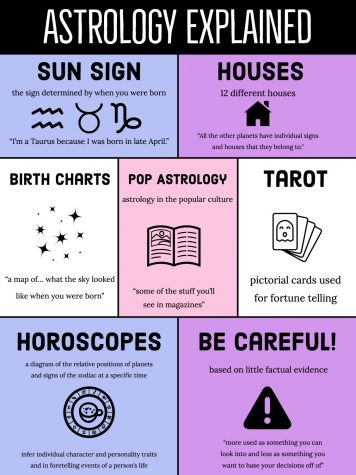
This chart simplifies the basic components of astrology.
“I focus on just the characteristics of stuff… you would find in a science class,” Molen said. “But when I look into astrology, I focus on some of the interpretations that have come from different cultures and different religions.”
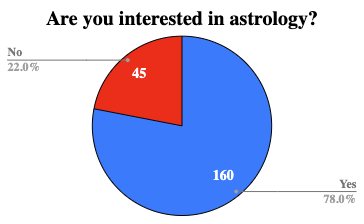
In a survey of 205 students, 160 of them expressed an interest in astrology.
Molen’s friends find astrology interesting as well, and she often shares the information she finds with them. She has explained the meanings of various astrological terms and even given “in-depth chart readings” to some people.
“Some of my friends have come up to me and ask for, like, just an interpretation of like their birth charts and stuff like that,” Molen said. “I have had some of my friends come up to me and be like, ‘Hey, can you just tell me what my moon sign is?’”
Molen says that a lot of the controversy surrounding astrology stems from not being able to discern between pop astrology, which is “some of the stuff you’ll see in magazines,” and “the more researched” material. Regardless of the stigma, she continues to delve deeper into the subject.
“I just find it really intriguing,” Molen said. “There’s a lot of books on it, there’s a lot of online sources.”
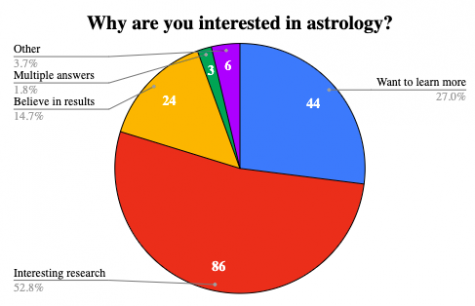
Of the 46 students not interested, 20 cited the main reason for their lack of interest as simply not believing in astrology. One extra response was counted.
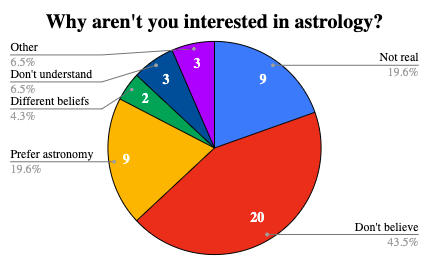
More than half of the students interested in astrology―52.8%―enjoy researching information about the subject. Three extra responses were counted.
Molen isn’t alone in the vast world of astrology. In a survey of 205 Padua students, a whopping 78% reported that they are interested in the subject. Those 160 students said that they were most fascinated with the research involved and want to learn more about astrology. Others truly believe in the results they find.
However, the remaining 22% of students do not show any interest in astrology, mostly because they do not believe or think it is real. Nine of those students preferred astronomy, while an additional five either held different beliefs that do not allow studying astrology or did not understand it at all.
Since it is based on little factual evidence, Molen’s own mother has doubts about her daughter’s interest in astrology. Molen does not let differing opinions hinder her further research because she is fascinated by the unknown.
“Humans are so, like, dependent on the world and we are so influenced by the world,” Molen said. “I don’t think it’s that far fetched that celestial beings or celestial planets have some sort of influence on the way we act.”

Emily Malone is a part of the Multimedia Journalism class at Padua and is editor and chief of Padua 360. She is a Senior at Padua who graduated middle...

